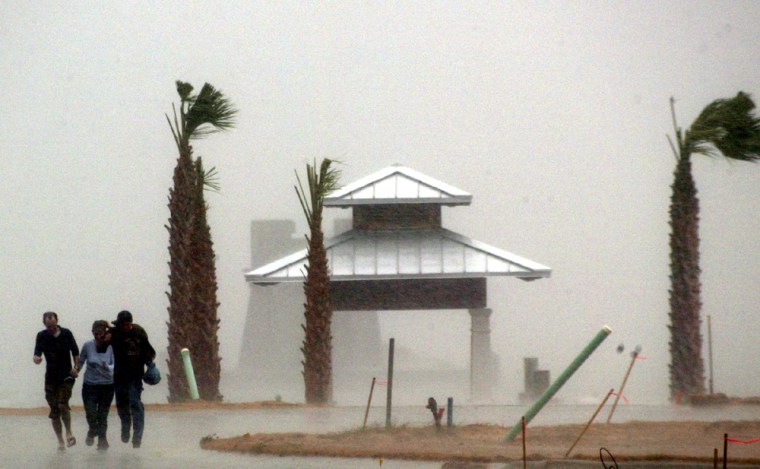This summer was a particularly busy time for the news staff at MSNBC. From our commemoration of the D-Day anniversary to the Olympics in Athens, from a presidential election to Governor McGreevey’s confession, from the soldiers bravely fighting a war on terror to the soldiers accused of abusing prisoners, the topics we’ve covered have been wide-ranging and heart-wrenching.
For me, a series of stories hit close to home this summer. Hurricanes Charley, Frances, Jeanne and Ivan pounded Florida, over and over again, and so many Floridians saw their homes destroyed and their dreams dashed. On Friday the 13th of August, Charley slammed into Punta Gorda, Florida with category 4-strength winds. It was the strongest hurricane to hit the United States since Andrew in 1992.
I was anchoring MSNBC’s hurricane coverage; but it was impossible to watch the warnings and the radar without thinking about my own family members, who are scattered across Florida.
My uncle has a wildlife refuge near Homestead, Florida. About 12 years ago, he had survived Hurricane Andrew, but that storm leveled his facility and his home. We knew from experience all the work and money it takes to repair and restore the damage from a Category 4 storm. I breathed a sigh of relief when I saw Charley skipping past that section of Florida.
Then, meteorologists predicted Charley’s path would take it right through my Grandma’s hometown of Bradenton. She lives alone, in a flood zone, along the Braden River. I called her just before I went on the air to make sure she was evacuating to my aunt’s house, about five miles inland.
My aunt is a sheriff’s deputy in that county. She spent long hours on the loudspeaker, the day of the hurricane, ordering residents to evacuate. She warned them that law enforcement authorities may not be able to rescue them once the hurricane hit and encouraged them to take shelter elsewhere.
My aunt arrived home shortly before the hurricane hit her area. Before long, she received a call from my MNSBC producers, asking her to do an interview on the air. When I introduced Aunt Deb, she described hearing the wind whipping against the roof and hearing debris blowing around outside the house. The next day, the family came outside to find their home intact. And Grandma was able to return to her own home the next morning.
My mom was not so lucky. She lives further north, in the Orlando area. Her power and phone lines went down fairly early in the day, so I wasn’t able to reach her by the time I started anchoring the hurricane coverage. The meteorologists with the National Hurricane Center were warning people in Orlando and Kissimmee that they were directly in the hurricane’s path. I watched the radar intently and noted that the eye of the storm seemed to pass directly over my mother’s neighborhood.
After Charley moved north, my mother went outside and saw a huge tree on her neighbor’s car. She saw roofs blown off and parts of houses scattered across the roads. The six-foot high brick wall surrounding her complex crumbled into ruins. Her own roof had been badly damaged, but at least, it was still on the house.
Mom says that going without electricity for days on end was the worst part for her. The food in the refrigerator and freezer rots. A slew of accidents happen because the traffic lights don’t work. You can’t fill up the car with gas because the pumps don’t have power. And the cell phones become unusable because you can’t recharge the battery. And some of my mom’s neighbors didn’t have power for two weeks.
For the folks who came out nearly unscathed, there were three more huge hurricanes to come. Though it was less powerful than Charley, Hurricane Frances was a giant, slow-moving storm. It dumped so much rain that water-damage and the threat of mold became a reality for more than a few Floridians.
What Charley and Frances didn’t tear apart, soak or destroy, Ivan and Jeanne did. Tarps covering already-damaged roofs ripped off, allowing inches of rainwater into homes. Battered walls that withstood two previous hurricanes finally gave way.
My heart breaks for those whose losses were severest, their tragedies of the greatest magnitude. About 117 people in Florida lost their lives. Many others lost their livelihoods. Businesses went broke. Entire crops were decimated. Experts estimate the damage from this hurricane season at $42 billion.
I sat at the anchor desk and watched these hurricanes unfold. The experience reminded me that it’s never just a news story. It’s someone’s story. I never know who is sitting back, watching the news coverage with anxiety, waiting to hear whether someone they love has been impacted by the events we are covering
I went to visit my Mom for Thanksgiving. I looked out from the plane window, and I saw what looked like a tent city— Tarps covered house after house. I saw piles of debris, stacked in front yards. Trees were uprooted and still laying where they’d fallen. And the bricks were still piled, right where they’d crumbled from the wall outside mom’s home. But her roof has been repaired, and the water that leaked inside had been cleaned up.
This year on Thanksgiving, we had so much to be thankful for. My family emerged from hurricane season without major tragedy, with damage that was just minor, and some great stories to tell in the years to come. For that, I feel so fortunate.
Check back at TV.MSNBC.COM as MSNBC's anchors and correspondents share their thoughts on covering the Stories of 2004.
